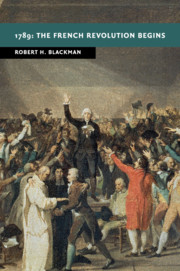'It might be assumed that there is little more to be said about how the French Revolution began with the creation of a National Constituent Assembly in the summer of 1789, but Robert H. Blackman's excellent book proves otherwise. By employing a series of fresh sources, he demonstrates precisely how the deputies seized the initiative and started founding a new order, despite Louis XVI's bad faith on the one hand, and pressure from the populace on the other. This study offers a stimulating reinterpretation of a momentous episode in European history.'
Malcolm Crook - University of Keele
'A splendid close study of the critical moments of 1789 as Old Regime slid into Revolution, debunking the argument that the political choices made by the deputies of 1789 progressed along an inexorable route allowing little scope for compromise. Blackman gives us a new understanding of the choices faced by the deputies of the Third Estate.'
Marisa Linton - Kingston University London
‘Blackman’s intense focus on the debates in and around the National Assembly results in a rich, convincing narrative, and deserves to become a standard reference for the political history of 1789.’
Peter McPhee
Source: H-France
‘… a novel interpretation of the first two years of the French Revolution … This clearly written study is an excellent addition to the historiography of the revolution … Highly recommended.’
S. P. Harshner
Source: Choice
‘Blackman’s work, based on decades of detailed study of the French Revolution’s first months, is a useful and necessary corrective to the post-revisionists who sought to make facile connections between the legislative debates of the early revolution and the complex forces that unleashed the Terror of 1793/4 … Blackman’s book will become required reading for anyone wishing to understand the complex political dynamics of the early French Revolution.’
Micah Alpaugh
Source: Journal of Interdisciplinary History
‘This excellent book provokes the reader to wonder 'what if' the delegates' fail-safes had worked, if moderate voices continued to place a check on radicalism, and terror did not eventually become the order of the day.’
Caroline Hackett
Source: H-Nationalism



